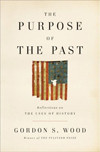 Gordon S. Wood is the Alva O. Way University Professor and professor of history at Brown University. He is the author of many award-winning works, including The Creation of the American Republic, 1776-1787, which won the Bancroft and John H. Dunning prizes and was nominated for the National Book Award; The Radicalism of the American Revolution, awarded the Pulitzer Prize and the Emerson Prize.
Gordon S. Wood is the Alva O. Way University Professor and professor of history at Brown University. He is the author of many award-winning works, including The Creation of the American Republic, 1776-1787, which won the Bancroft and John H. Dunning prizes and was nominated for the National Book Award; The Radicalism of the American Revolution, awarded the Pulitzer Prize and the Emerson Prize.
Now comes his newest book, The Purpose of the Past, which is a collection of long-form book reviews Wood’s wrote during the past 25 years for the New York Review of Books and the New Republic. The book holds together nicely thematically, which can be an issue with a book of “reviews.” However, as you’ll see there is a consistent element to the tone of the book which starts with Wood’s review of Garry Wills’ Explaining America (1981) and ends with his thoughts on Robin L. Einhorn’s American Taxation, American Slavery (2006). What also makes The Purpose of the Past worthy of purchase is that Wood offers an “Afterward” with new insights or thoughts since the publication of the review he wrote.
 A fellow reviewer offered this description of the book: “The Purpose of the Past is not another crotchety elegy for what history once was but sadly now isn’t; it is also a celebration of what, at its best, it is, and a powerful argument for its ongoing necessity,” and I could not agree more.
A fellow reviewer offered this description of the book: “The Purpose of the Past is not another crotchety elegy for what history once was but sadly now isn’t; it is also a celebration of what, at its best, it is, and a powerful argument for its ongoing necessity,” and I could not agree more.
In her book, Mothers of Invention: Women of the Slaveholding South in the American Civil War, historian Drew Faust hoped to offer “a sense of how people are shaped and constrained by the world into which they are born, of how their choices are limited by the ‘taken for grantedness’ of their social universe.” Faust wanted to show “how people managed not just to accept, but to justify social arrangements we today find abhorrent.”
For both good and bad, notes Wood, the last 40 years have seen significant changes in the field of history. Though after reading The Purpose of the Past, one gets the sense this “historiographical revolution” has been more bad than good. Obviously, a matter of opinion.
The 1960s and 70s awakened budding historians to cast away the “top down” approach for the “bottom up” and this produced incredible work that for the first time brought understanding and appreciation for women, blacks, and other minorities that had been ignored. Today social, or “cultural” history is thriving. But we still need balance and that seems to be lost on most universities.
As Wood points out, the evolution and dominance in academia of “cultural” history has produced universities where they have “stopped” hiring anyone but cultural historians. Wood seems to have a problem with this as it does not provide for balance.
Cultural historiography is, in Wood’s viewpoint, dominated by historians who see themselves “essentially as cultural critics” who do not seek to truly understand the past “on its own terms,” but to “use history to empower people in the present.” Strong words, indeed, and for some cultural historians, they be fight’n words.
Historian Bernard Bailyn noted that it was human nature to want to “extract from the past some kind of bearing on contemporary problems,” or to want to see something that is not always there. To impose a contemporary view on the past can be trouble if the historian does not employ “critical control,” as without it generates “presentism” and then all meaning is lost.
Memory and history become at odds and ultimately history becomes the destructor of memory, Wood notes. History is indeed “used” by some cultural historians who have agendas. Taking the past not on its own terms, but by imposing the present upon it for personal or political purposes, according to Wood, has become the downfall of some “cultural” historians during the past 25 years.
In his Introduction to the book (p.11) Wood writes:
“To be able to see the participants of the past in this comprehensive way, to see them in the context of their own time, to describe their blindness and folly with sympathy, to recognize the extent to which they were caught up in changing circumstances over which they had little control, and to realize the degree to which they created results they never intended — to know all this about the past and to be able to relate it without anachronistic distortion to our present is what is meant by having a historical sense.”
There are no grand lessons to be learned from the past, Wood surmises, only more questions, and at best we can seek to humanize and develop what Wood calls a “historical sense” of things, and do so without “anachronistic distortion.”
Powerful words, indeed.
Through 21 exceptional and thoughtful past reviews, Wood tackles such subjects as: Narrative History, The Lessons of History, History as High Politics, History without Ideas, Postmodern History, Multicultural History, History as Cultural Criticism, Presentism in History, among others.
This is a book you have to at least read, if not own.
Listen to an interview with Gordon S. Wood, or you can also read his reviews.